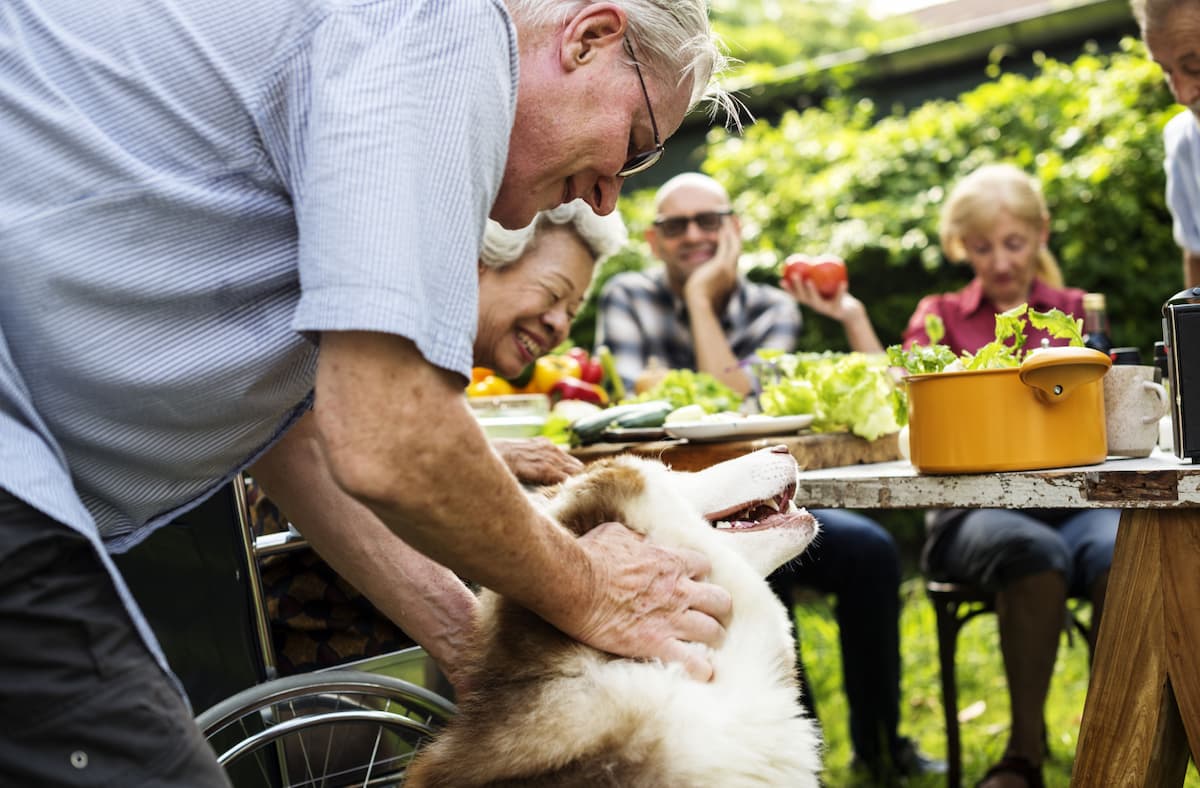You may have heard of pet therapy for seniors, but pets can play a larger part in an older adult’s life. The role of pets in senior assisted living ranges from physical and emotional health benefits but can also extend to benefiting the caregiving staff.
As long as your loved one’s community allows pets, we’ve included a short guide with some things to consider when picking out a faithful companion. There’s no such thing as the perfect pet for every person, but there could be the perfect pet out there waiting to come home with your senior loved one.
Benefits of Pets for Seniors
Having a pet can benefit older adults in several ways, but it can also benefit their caregivers in a roundabout way.
Physical Health Benefits
Research has shown that owning a pet can positively affect older adults’ physical health. Pets can help lower stress levels, reduce blood pressure, and even decrease the risk of heart disease. By moving around and playing with their pets, older adults are also more likely to maintain an active lifestyle. This makes them less prone to mobility issues and other health problems associated with sedentary behavior.
Emotional Health Benefits
Pets can also be beneficial to older adults from an emotional standpoint. The presence of a pet can bring comfort and a sense of meaning to older adults’ lives, especially those who may live away from family or have few visitors. They can also offer a way to connect with others in the community who share a similar love for animals. For many older adults, pets are almost like family members, and being able to spend time with them can be a vital aspect of their overall well-being.
Benefits for the Caregiving Staff
Allowing pets in senior assisted living facilities can also benefit the caregiving staff, as pets can bring a sense of calm and relaxation to their owners and those around them. Many senior homes now have therapy pets that visit the community and interact with the residents. Simply petting a dog can reduce stress and increase staff members’ moods, improving residents’ quality of care.
How to Choose the Right Pet for a Senior
Choosing a pet is personal, as it depends on an individual’s likes and dislikes. An older adult’s living situation may also contribute to the choice of pet they can choose. One important thing to remember is that not all communities will allow pets—or any type of animal. So, an older adult should consult with their community director to learn any community-specific rules before choosing.
Consider Your Lifestyle
Different pets require different levels of care and attention, so choosing a pet that fits your lifestyle is important. Suppose you’re already struggling with mobility or have medical conditions that affect your ability to take care of a pet. In that case, a low-maintenance companion like a fish might be perfect. If you’re still active and enjoy walking, a dog might be a great addition to your life.
Consider the Size of Your Home or Space
The space you have is another important factor to consider when choosing a pet. A large breed dog might not be the best choice if you live in a small apartment. On the other hand, a small dog or a cat might thrive in smaller spaces. But a large dog breed might be a good fit if you have the space—like a fenced backyard.
Choose a Pet With a Compatible Temperament
Just like people, pets have different personalities, and choosing one that matches yours is essential. If you’re a quiet, introverted person, you might prefer a cat or a small dog that enjoys cuddling and lots of silent moments. On the other hand, if you’re a more active and outgoing person, a dog that loves to play and go for walks might work better.
Consider the Cost
Caring for a pet can be expensive, so choosing a pet that fits your budget is important. Different animals have different needs. Some might require more care than others. For example, a large dog might need more food, toys, and vet visits than a small cat. When choosing, it’s important to factor in the cost of food, supplies, and medical care.
Adopt, Don’t Shop
There are thousands of animals waiting for forever homes, and adopting a pet is a great way to save a life and bring love and companionship into your own life. Many shelters have senior pets available for adoption, and these animals are often already trained and socialized, making the transition to a new home easier for both of you.

Discuss Your Senior Living Options With Us
The companionship offered by pets can be immeasurable, particularly for older adults. And always remember, the right pet isn’t just an addition to your life but a companion who’ll share in your day-to-day experiences, making each moment a bit more special.
Give us a call at The Legacy at Town Square today and book a community tour. We’re happy to show you the difference a LifeWell Community can make in your loved one’s life. Our team can also answer your questions about bringing along a furry friend.

